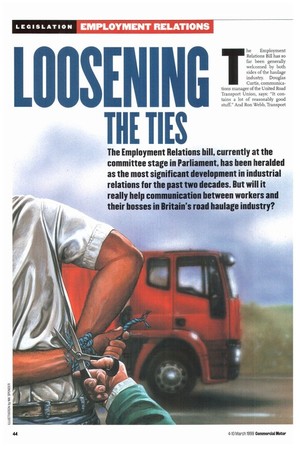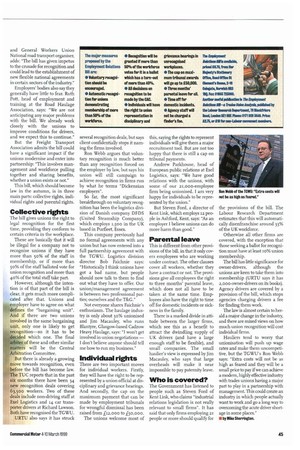LOOSEN NC
Page 46

Page 47

If you've noticed an error in this article please click here to report it so we can fix it.
THE TIES
The Employment Relations bill, currently at the committee stage in Parliament, has been heralded as the most significant development in industrial relations for the past two decades. But will it really help communication between workers and their bosses in Britain's road haulage industry?
he Employment Relations Bill has so far been generally welcomed by both sides of the haulage industry. Douglas Curtis, communications manager of the United Road Transport Union, says: "It contains a lot of reasonably good stuff" And Ron Webb, Transport and General Workers Union National road transport organiser, adds: "The bill has given impetus to the crusade for recognition and could lead to the establishment of new flexible national agreements in certain sectors of the industry."
Employers' bodies also say they generally have little to fear. Ruth Pott, head of employment and training at the Road Haulage Association, says: "We are not anticipating any major problems with the bill. We already work closely with the unions to improve conditions for drivers, and we expect this to continue."
But the Freight Transport Association admits the bill could have a significant impact if the unions modernise and enter into partnership: This involves management and workforce pulling together and sharing benefits, whether a union exists or not" This bill, which should become law in the autumn, is in three main parts: collective rights, individual rights and parental rights.
Collective rights
The bill gives unions the right to legal recognition for the first time, providing they conform to certain criteria in the workplace.
These are basically that it will be illegal for a company not to recognise unions if they have more than 5o% of the staff in membership, or if more than 50% of the staff balloted vote for union recognition and more than 40% of the total staff take part.
However, although the intention is of that part of the bill is clear, it gets much more complicated after that. Unions and employer have to agree on what defines the "bargaining unit". And if there are two unions involved in the same bargaining
1 , unit, only one is likely to get . recognition—so it has to be decided which one. The final arbiter of these and other similar matters will be the Central Arbitration Committee. . But there is already a growing , move towards recognition, even before the bill has become law. 'The TUC reports that in the past six months there have been 34 new recognition deals covering 63,500 workers. Two of these deals include non-driving staff at Exel Logistics and 14 car transporter drivers at Richard Lawson. Both have recognised the TGWU.
URTU also says it has struck
several recognition deals, but says client confidentially stops it naming the firms involved.
Ron Webb argues that voluntary recognition is much better than any recognition forced on the employer bylaw, but says his union will still campaign to achieve recognition in firms run by what he terms "Dickensian employers".
So far, the most significant breakthrough on voluntary recognition has been the logistics division of Danish company DFDS (United Steamship Company), which employs 1,500 in the UK based in Purfleet, Essex.
This company previously had no formal agreements with any union but has now entered into a full partnership agreement with the TGWU. Logistics division director Bob Faichnie says: "Historically I think unions have got a bad name, but people should now talk to them to find out what they have to offer. Our union/management agreement is between two professional parties; ourselves and the T8t.G."
Not everyone shares Faichnie's enthusiasm. The haulage industry is only about 30% unionised and Jim Macauley, who runs Blantyre, Glasgow-based Cadzow Heavy Haulage, says: "I won't get involved in union negotiations — I don't believe anyone should tell me how to run my business."
Individual rights
There are two important moves for individual workers. Firstly, they will have the right to be represented by a union official at disciplinary and grievance hearings. And secondly, the cap on the maximum payment that can be made by employment tribunals for wrongful dismissal has been raised from L12,000 to L5o,000.
The unions welcome most of this, saying thets to represent individuals will give them a major recruitment tool. But are not too happy that there is still a cap on tribunal payments.
Andrew Parkhouse, head of European public relations at Exel Logistics, says: "We have good relations with the unions, with some of our 21,000-employee firm being unionised. I am very happy for individuals to be represented by the union."
But Steven Ford, a director of Kent Link, which employs 12 people in Ashford, Kent, says: "As an employer I believe unions can do more harm than good."
Parental leave
This is different from other provisions of the bill, in that it only covers employees who are working under contract. The other clauses cover all workers, whether they have a contract or not The provisions give all employees the right to three months' parental leave, which does not all have to be taken at the same time. Employees also have the right to time off for domestic incidents or sickness in the family.
There is a marked divide in attitude between the larger firms, which see this as a benefit to attract the dwindling supply of UK drivers (and have a large enough staff to be flexible), and small companies. The small haulier's view is expressed by Jim Macauley, who says that large overheads will make it near impossible to pay paternity leave.
Who is covered?
l'he Government has listened to people such as Steven Ford of Kent Link, who claims "industrial relations legislation is not really relevant to small firms". It has said that only firms employing 21 people or more should qualify for
the provisions of the bill. The Labour Research Department estimates that this will automatically disenfranchise around 33% of the UK workforce.
Otherwise all other firms are covered, with the exception that those seeking a ballot for recognition must have at least fo% union membership.
The bill has little significance for owner-drivers, although the unions are keen to take them into membership (URTU says it has 2,000 owner-drivers on its books). Agency drivers are covered by a provision of the bill, which stops agencies charging drivers a fee for finding them work.
The law is almost certain to herald a major change in the industry, and there are mixed views on how much union recognition.will cost individual firms.
Hauliers tend to worry that unionisation will push up wage rates and make them uncompetitive, but the TGWU's Ron Webb says: "Extra costs will not be as high as feared and they will be a small price to pay if we can achieve a modern, highly effective industry with trades unions having a major part to play in a partnership with management This could create an industry in which people actually want to work and go a long way to overcoming the acute driver shortage in some places."
• by Mike Sherrington.








































































































